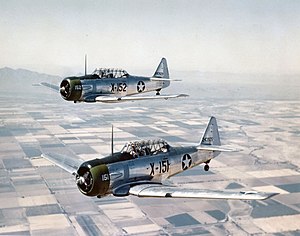Our website is made possible by displaying online advertisements to our visitors.
Please consider supporting us by disabling your ad blocker.
North American T-6 Texan
| T-6 Texan/SNJ/Harvard | |
|---|---|
 USAAF AT-6Cs near Luke Field, 1943 | |
| General information | |
| Type | Trainer aircraft |
| National origin | United States |
| Manufacturer | North American Aviation |
| Primary users | United States Army Air Forces |
| Number built | 15,495 |
| History | |
| First flight | 1 April 1935 |
| Retired | 1995 (South African Air Force) |
| Developed from | North American NA-16 |
| Variants | North American A-27 Bacon Super T-6 |
| Developed into | North American P-64 |
The North American Aviation T-6 Texan is an American single-engined advanced trainer aircraft used to train pilots of the United States Army Air Forces (USAAF), United States Air Force (USAF), United States Navy, Royal Air Force, Royal Canadian Air Force and other air forces of the British Commonwealth during World War II and into the 1970s.
Designed by North American Aviation, the T-6 is known by a variety of designations depending on the model and operating air force. The United States Army Air Corps (USAAC) and USAAF designated it as the AT-6, the United States Navy the SNJ, and British Commonwealth air forces the Harvard, the name by which it is best known outside the US. Starting in 1948, the new United States Air Force (USAF) designated it the T-6, with the USN following in 1962.
The T-6 Texan remains a popular warbird used for airshow demonstrations and static displays. It has also been used many times to simulate various historical aircraft, including the Japanese Mitsubishi A6M Zero. A total of 15,495 T-6s of all variants were built.
Previous Page Next Page


